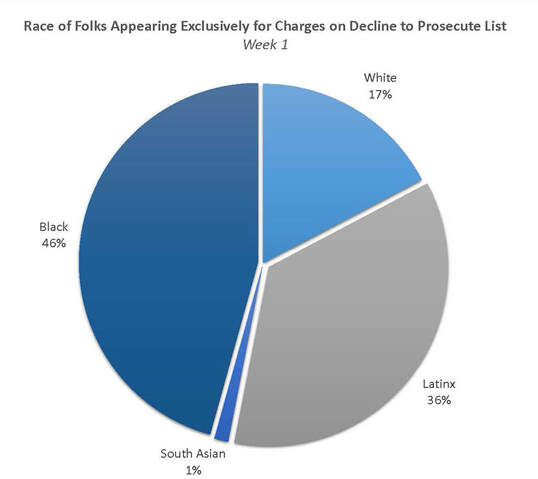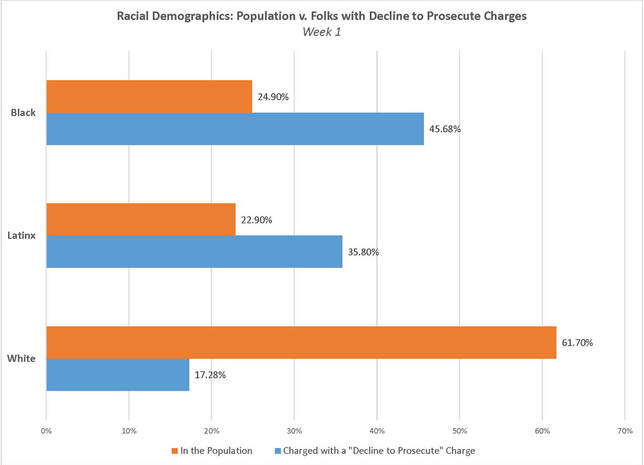|
1/11/2019 1 Comment The First Week
From January 2nd to January 8th, our courtwatchers observed 176 unique arraignments. Forty-five percent (45%) of those arraignments involved only charges that Suffolk County District Attorney Rachael Rollins has pledged to decline to prosecute, either by dismissing at arraignment or diverting through a non-criminal proceeding, program, or outcome.
The following data pertain to cases involving only these charges. We did not analyze cases that may have included a charge on this list as well as some other charge. Although courtwatchers are documenting “other charges” in an open-ended field, it is not the focus of this project to gather data about all cases. We are focused on seeing the transformation of arraignment court with respect to the charges which District Attorney Rollins pledged to decline.
Courtwatchers observed 79 cases involving ONLY charges on the decline to prosecute list.
What gets dismissed or diverted?
The vast majority of outright dismissals were driving cases – 21 of the 27 cases (78%) that our courtwatchers observed get dismissed. The other 6 cases which were dismissed at arraignment were incidents of: Trespass (2); Drug Possession (2); Shoplifting (1), and a default for failure to show proof of community service completion on an earlier case (1).
A majority of driving cases were dismissed or diverted this week at arraignment.
Release or Detention Decision
In 36 of these cases, the person being arraigned was released on personal recognizance. In many such cases, the court also imposed conditions—especially common was a stay away or no contact order for the place of the incident or a person involved.
In 7 of these cases, bail was set. Bail amounts ranged from $40 to $700. We do not know how one case resolved because the arraignment was pushed to later in the day and the courtwatcher left before the case resumed. Two cases resolved with some other outcome—in one case, a guilty plea on a driving offense resulting in 10 days house arrest (minus time served in jail); in another, a section 35 civil commitment. The charge breakdowns are as follows [keep in mind that some folks had multiple charges]:
In 16 of these cases, the person being arraigned was in jail at the time of arraignment. Among those 16 individuals, 9 were released on personal recognizance, 1 had their case diverted (charge was drug possession), and 1 had their case dismissed (charge was trespass).
In other words, 11 people spent time in jail and ultimately were not prosecuted or were released; they were in detention without an ability to shower, change clothes, see their kids, walk their pets, take their medications, or communicate with their jobs or families—only to have a judge determine there was no good reason to detain them.
Among all of the cases observed during the first week that fall within the “charges to be declined” policy, the racial breakdown of the people arraigned is as follows:[2]
46% Black, 36% Latinx; 17% white, and 1% South Asian.
According to the U.S. Census Bureau, the demographics of Suffolk County are as follows:
24.9% Black or African American, 22.9% Hispanic of Latino, 61.7% white, 9.1% Asian, 3.4% two or more races, .7% Native American or Alaskan Native and .2% Native Hawaiian or Pacific Islander In other words, Black and Latinx defendants are starkly overrepresented compared to the population, while white defendants are starkly underrepresented. Cause for Concern: Practices to Change
Courtwatchers observed three cases in which an ADA asked for bail but the judge ultimately released the individual on personal recognizance. In all three cases, the ADA asked for $500 bail. Those cases involved charges of (1) larceny from a building; (2) drug possession & possession with intent to distribute; and (3) driving charges & possession with intent to distribute.
Going forward, we hope ADAs will always recommend release on personal recognizance in cases when the person is not a flight risk. Further, ADAs should never request bail for charges that are on the do not prosecute list. Takeaways: Reactions from the CourtWatch MA team
Even though we work every day to reduce harm in the criminal punishment system, we were still shocked to see data that so clearly backs up what we have long known from our friends, families, colleagues, and neighbors:
[1] Courtwatchers write down demographic information (age, race, gender) based on observation alone; we recognize that this is an imperfect way to determine markers of identity. We ask courtwatchers to note this information because (1) courts are unlikely to disclose this information even if we requested every docket; and (2) the system operates based on an individual’s outward perception and expression, regardless of their stated identity, so demographic observations are a reasonable methodology for this particular project.
[2] Courtwatchers could check as many boxes as applied. Addendum: Though Courtwatchers noted that bail included amounts as little as $40, we believe the $40 charge was most likely instead the non-refundable $40 statutory fee paid to the bail magistrate or bail commissioner, a clerk (who isn't a judge and in many cases is not a lawyer and has no formal legal education) who sets bail when court is not in session.
1 Comment
|
AuthorCourt Watch MA is a community project with the goal of shifting the power dynamics in our courtrooms by exposing the decisions judges and prosecutors make about neighbors every day. Archives
November 2019
Categories |


 RSS Feed
RSS Feed